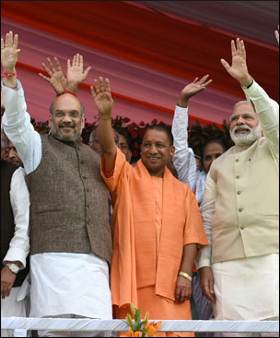|

|
Post assembly elections, time for bold reforms
|
|

|
|
| Top Stories |
 |
|
|
|
Amit Kapoor | 21 Mar, 2017
The just-concluded assembly elections and the unparalleled performance
of the BJP have been the highlight of the weekend. The elections,
happening mid-way of the partys term at the Centre and coming
immediately post-demonetisation, were practically a referendum on Prime
Minister Narendra Modis leadership.
The party's historic
performance in the country's most populous state must have provided him
with a sense of vindication and confidence after months of criticism for
his bold demonitisation gamble on November 8, 2016. However, the
implications of these election results lie far beyond the states and the
party. The economy has much to gain or lose depending on the course
policy-making takes from here onwards.
The magnitude of support
shown by voters for the BJP in the states leaves it with a high
possibility of being re-elected in the 2019 general elections. The
current electoral performance also ensures the party a majority in the
Rajya Sabha by 2019, which has been a major hindrance for any productive
functioning of the Parliament off late. A sense of continuity and
political stability is the best outcome that the nation could have hoped
for in times of global uncertainty. The election results act as a
positive signalling mechanism for multiple stakeholders in the economy.
First,
political stability begets economic stability. An assurance of
continuity in government policies sends out a positive signal to foreign
and domestic investors about the country's economic scenario. No sudden
policy shocks to the economy are generally expected to take place in
such a situation like the ones taking place in the US right now with the
repeal of Trans-Pacific Partnership (TPP) and Obamacare. This will also
ensure a continuity in the functioning of GST, which is expected to be
inflationary in its initial years of implementation and can become an
electoral issue in 2019.
As the world moves towards uncertain
protectionism, an economy with a stable political regime and sound
economic policies that is welcoming to foreign investors can be a beacon
of hope. It can also go a long way in reviving the subdued domestic
investor sentiment. Although, the latter will also require bold reforms
to deal with the problem of bad debts.
This brings us to the
second point. The confidence instilled by voters in the party can
encourage it to bring about a slew of bold reforms that political
parties have been holding back for decades due to the fear of losing
political ground. To begin with, the long-standing call for labour
reforms can be addressed. Such a move will complement the government's
intent on improving the ease of doing business and also inspire investor
confidence. Additional Measures can include reforming the direct tax
code, introducing a Uniform Civil Code and privatisation of white
elephant PSUs. An opportunity to make such radical policy changes that
have significant long-term benefits come rarely. The Modi government can
do well to capitalise on it.
The third significant signal: The
Indian vote bank has been infamous for catering to caste politics. Uttar
Pradesh has been the epitome of such electoral practices owing to its
varied population distribution. On the contrary, in the current
elections, the voter base seems to have responded to practical calls for
development rather than to an emotional connect of erstwhile rulers of
UP's political corridors.
The change in voting behaviour
highlights two important points. The obsession with caste is losing
importance at the ground level, and it is the time that the media and
political parties recognise this fact and follow suit. Second, the shift
to focus on development signifies the rising aspirations of the Indian
population and their rising demand for more jobs and opportunities,
which has been promised to them.
This is an area that the
government has been unable to improve upon along with restoring investor
confidence in the country. Now, with a significant portion of north and
west India under its belt, cooperation between the Centre and the State
and coordination between their policies will be much achieved easily.
This is much more true in the case of BJP than it was for earlier ruling
parties at the Centre since the state Chief Ministers will recognise
the contribution that the Prime Minister has had in their electoral wins
and will be wary of resisting any policy suggestions from PMO.
Therefore, materialising voter aspirations by improving investor
confidence, which will already be given a boost owing to the current
political scenario, should be on top of the government's agenda. It now
has considerable power to act upon this.
(Amit Kapoor is chair,
Institute for Competitiveness, India. The views expressed are personal.
He can be reached at amit@amitkapoor.com and tweets @kautiliya. Chirag
Yadav, a researcher at the Institute, contributed to the article.)
|
|
|
| |
|
|
|
|
|
|
|
|
|
|
|
|
|
|
| |
| Customs Exchange Rates |
| Currency |
Import |
Export |
US Dollar
|
84.35
|
82.60 |
UK Pound
|
106.35
|
102.90 |
Euro
|
92.50
|
89.35 |
| Japanese
Yen |
55.05 |
53.40 |
| As on 12 Oct, 2024 |
|
|
| Daily Poll |
 |
 |
| Do you think Indian businesses will be negatively affected by Trump's America First Policy? |
|
|
|
|
|
| Commented Stories |
 |
|
|
|
|
|
| |
|